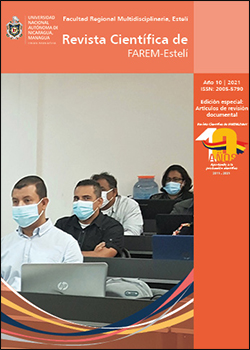Conceptual Elements for the historical construction of a locality
DOI:
https://doi.org/10.5377/farem.v0i0.11604Keywords:
Regional and local history, historical memory, oral history, social networksAbstract
The present work aims to review the conceptual elements that support the historical construction of a locality; Through theories related with the microhistory and social networks. In the methodology in was proceeded to consult of the National Council of Universities (CNU), referring to books, doctoral theses, and articles related to the study object; this resource was exhausted, and the research was carried out in Google academic. For each subject, several titles were explored, the ideas related to the subject were collected, and the information was analyzed; by author and by concepts, the ideas that contributed to the basis of the research problem were selected. It is concluded that for the construction of the history of a locality, several components of the bibliographic methods must be integrated, such as: the regional and local history, historical memory, social networks, life and oral history, for the rescue of facts, events and their meanings, of a determined period of the society in a territory. It is not only about the knowledge from the past but it also implies the organization of people so that from their individuality they become part of collective thought.
Downloads
References
Benadiba, L. (2005) introducción a la Historia Oral recuperado de:https://es.scribd.com/document/364545151/De-Entrevistadores-y-Relatos-de-Vida-Introduccion-a-La-Historia-Oral
Benadiba, L. (2009), Historia oral, relatos y memorias. CONHISREMI, Revista Universitaria de Investigación y Diálogo Académico. Vol. 5, No. 1, recuperado de:https://www.comisionporlamemoria.org/archivos/archivo/archivo-oral/bibliografia/Historia%20oral, %20relatos%20y%20memoria_introduccion.pdf
Chárriez Cordero, M. (2012) (1). Historias de vida: Una metodología de investigación cualitativa. Revista Griot, 5(1), 50-67. Recuperado a partir de https://revistas.upr.edu/index.php/griot/article/view/1775
Gailondo, Á. (1999). Lectura del tiempo pasado: Memoria y olvido. Recuperado de https://www.academia.edu/23969014/Ricoeur_La_lectura_del_tiempo_pasado_Memoria_y_Olvido?auto=download
González, Matias and Montanares, Elizabeth and Martínez, Francisca, (2018): Estudio reflexivo para abordar la Historia local en Chile desde la versión anglosajona (A Reflective Study to Approach the Local Chilean History from the Anglo-Saxon Perspective) (January 1, 2018). HiSTOReLo. Revista de Historia Regional y Local, Vol. 10, No. 19, enero - junio de 2018, Available at SSRN: https://ssrn.com/abstract=3139959 or http://dx.doi.org/10.2139/ssrn.3139959p
Halbwachs, M. & Díaz, A. (1995). Memoria colectiva y memoria histórica. Reis, (69), 209-219. doi:10.2307/40183784. Recuperado de: https://www.jstor.org/stable/40183784
Lozares, Colina, C. (1996). Teoría de las redes sociales, Las redes sociales. Revista Papers, no.48 recuperado de https://ddd.uab.cat/record/53049?ln=en&of=hm
Molina, Jiménez, I, (1996). De la Historia Local a la Historia social: algunas notas metodológicas.Volumen51no.1recuperadode:https://revistas.ucr.ac.cr/index.php/reflexiones/article/view/10926 21/22
Muller, Mermejo. (2013). Fuentes de las memorias Colectivas: los recuerdos vividos e históricos. Revisat de Psicología volumen no.2.recuperado de:http://www.scielo.org.pe/scielo.php? pid=S0254-92472013000200004&script=sci_arttext
Ponce, A. (,2008), Redes sociales y ejercicio del poder en la América Hispana: consideraciones teóricas y propuestas de análisis1, Revista Complutense de Historia de América, vol.34,15-42P.P recuperado:https://revistas.ucm.es/index.php/RCHA/article/download/RCHA0808110015A/28432
Reina, L. (1992). Historia Regional e Historia nacional. Revista Historias, estudios historicos.inah.gob.mx,recuperadode:https://www.estudioshistoricos.inah.gob.mx/revistaHistorias/wpcontent/uploads/Historias_29_131-142.pdf
Ricoeur,P (1999). Lectura del tiempo: Memoria y Olvido, Recuperado de https://www.academia.edu/23969014/Ricoeur_La_lectura_del_tiempo_pasado_Memoria_y Olvido?auto=downloadISBN:84-923792-2-7
Serrano Álvarez,P. (2009). La Historia local en América Latina Tendencias, corrientes y perspectivas en el siglo XX Historelo.rev.hist.reg.loca l vol.1 no.1 Medellín Jan. /June 2009 Tomado de: http://www.scielo.org.co/scielo.php? script=sci_arttext&pid=S2145-132X2009000100002
Thompson, P. (2004) ¿Historia oral y contemporaneidad, recuperado de:http://biblioteca.puntoedu.edu.ar/bitstream/handle/2133/11963/204-353-1-PB.pdf? sequence=2&isAllowed=y
Venegas, H. (2010), Metodología de la investigación en Historia Regional y Local, Archivo General de la Nación Volumen XCl, recuperado de Descargar - Archivo General de la Nación (yumpu.com) ISBN 978-9945-020-78-6
Vera, Jaramillo, J. (2014), Eric Hobsbawm, Revista Divergencia n.º 16, marzo de 2014 | Universidad Externado de Colombia: recuperado de: https://core.ac.uk/download/pdf/230103385.pdf revista p,70
Villalta Quezada, C. (1993) Redes Sociales: Un concepto con importantes implicaciones en la intervención comunitariahttp://www.copmadrid.org/webcopm/publicaciones/social/1993/vol1/arti6.htm
Published
Issue
Section
License
Copyright (c) 2021 Revista Científica de FAREM-Esteli

This work is licensed under a Creative Commons Attribution-NonCommercial-ShareAlike 4.0 International License.



